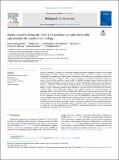Files in this item
Raptor research during the COVID-19 pandemic provides invaluable opportunities for conservation biology
Item metadata
| dc.contributor.author | Sumasgutner, Petra | |
| dc.contributor.author | Buij, Ralph | |
| dc.contributor.author | McClure, Chris | |
| dc.contributor.author | Shaw, Philip | |
| dc.contributor.author | Dykstra, Cheryl | |
| dc.contributor.author | Kumar, Nishant | |
| dc.contributor.author | Rutz, Christian | |
| dc.date.accessioned | 2021-07-30T14:30:18Z | |
| dc.date.available | 2021-07-30T14:30:18Z | |
| dc.date.issued | 2021-08 | |
| dc.identifier | 274077768 | |
| dc.identifier | 8f5b23de-e220-4064-85cd-acecfc23ee0c | |
| dc.identifier | 85106312952 | |
| dc.identifier | 000679541200011 | |
| dc.identifier.citation | Sumasgutner , P , Buij , R , McClure , C , Shaw , P , Dykstra , C , Kumar , N & Rutz , C 2021 , ' Raptor research during the COVID-19 pandemic provides invaluable opportunities for conservation biology ' , Biological Conservation , vol. 260 , 109149 , pp. 1-17 . https://doi.org/10.1016/j.biocon.2021.109149 , https://doi.org/10.1016/j.biocon.2021.109149 | en |
| dc.identifier.issn | 0006-3207 | |
| dc.identifier.other | RIS: urn:EA2A5C99242132642AF59E91766358DB | |
| dc.identifier.other | ORCID: /0000-0001-5187-7417/work/93514707 | |
| dc.identifier.other | ORCID: /0000-0002-8183-0289/work/143336061 | |
| dc.identifier.uri | https://hdl.handle.net/10023/23686 | |
| dc.description | Authors acknowledge financial support from: the Dean Amadon Grant of the Raptor Research Foundation (to PS); the Raptor Research and Conservation Foundation, Mumbai, and the University of Oxford's Global Challenges Research Fund through the Ind-Ox initiative (KCD00141-AT13.01) (both to NK), and the Gordon and Betty Moore Foundation (GBMF9881) and the National Geographic Society (NGS-82515R-20) (both to CR). | en |
| dc.description.abstract | Research is underway around the world to examine how a wide range of animal species have responded to reduced levels of human activity during the COVID-19 pandemic. In this perspective article, we argue that raptors are particularly well-suited for investigating potential ‘anthropause’ effects, and that the resulting insights will provide much-needed impetus for global conservation efforts. Lockdowns likely alter many of the extrinsic factors that normally limit raptor populations. These environmental changes are in turn expected to influence – mediated by behavioral and physiological responses – the intrinsic (demographic) factors that ultimately determine raptor population levels and distributions. Using this framework, we identify a range of research opportunities and conservation challenges that have arisen during the pandemic. The COVID-19 anthropause allows raptor researchers to address fundamental and applied research objectives in a large-scale, quasi-experimental, well-replicated manner. Importantly, it will be possible to separate the effects of human disturbance and anthropogenic landscape modifications. We explain how high-quality datasets, accumulated for a diverse range of raptor species before, during, and after COVID-19 lockdowns, can be leveraged for powerful comparative analyses that attempt to identify drivers of particular response types. To facilitate and coordinate global collaboration, we are hereby launching the ‘Global Anthropause Raptor Research Network’ (GARRN). We invite the international raptor research community to join this inclusive and diverse group, to tackle ambitious analyses across geographic regions, ecosystems, species, and gradients of lockdown perturbation. Under the most tragic of circumstances, the COVID-19 anthropause has afforded an invaluable opportunity to significantly boost global raptor conservation. | |
| dc.format.extent | 17 | |
| dc.format.extent | 1731430 | |
| dc.language.iso | eng | |
| dc.relation.ispartof | Biological Conservation | en |
| dc.subject | Anthropause | en |
| dc.subject | Before-after-control-impact (BACI) | en |
| dc.subject | Birds of prey | en |
| dc.subject | Human disturbance | en |
| dc.subject | Human-wildlife interactions | en |
| dc.subject | Lockdown | en |
| dc.subject | Natural experiment | en |
| dc.subject | COVID-19 | en |
| dc.subject | QH301 Biology | en |
| dc.subject | 3rd-DAS | en |
| dc.subject.lcc | QH301 | en |
| dc.title | Raptor research during the COVID-19 pandemic provides invaluable opportunities for conservation biology | en |
| dc.type | Journal article | en |
| dc.contributor.sponsor | Gordon and Betty Moore Foundation | en |
| dc.contributor.sponsor | National Geographic Society | en |
| dc.contributor.institution | University of St Andrews. School of Biology | en |
| dc.contributor.institution | University of St Andrews. Centre for Biological Diversity | en |
| dc.contributor.institution | University of St Andrews. Institute of Behavioural and Neural Sciences | en |
| dc.contributor.institution | University of St Andrews. Centre for Social Learning & Cognitive Evolution | en |
| dc.identifier.doi | 10.1016/j.biocon.2021.109149 | |
| dc.description.status | Peer reviewed | en |
| dc.identifier.grantnumber | en | |
| dc.identifier.grantnumber | NGS-82515R-20 | en |
This item appears in the following Collection(s)
Items in the St Andrews Research Repository are protected by copyright, with all rights reserved, unless otherwise indicated.

